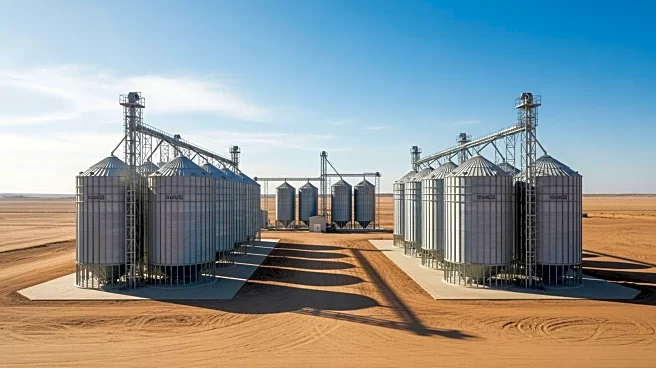What's Happening?
Leading food companies in Saudi Arabia are increasing their feed production capabilities to meet rising demand. Tanmiah Food Company has launched a high-tech feed mill in Dahna, designed to support its
poultry operations with premium-quality feed. The mill features a fully automated production line with strict quality controls and advanced biosecurity measures. This initiative is part of Tanmiah's broader vision to become the top global halal, sustainable, healthy protein company by 2030. Over the past two years, Tanmiah has invested SAR 1.5 billion ($400 million) in various projects across Saudi Arabia. Concurrently, Arabian Mills for Food Products Co. plans to expand its flour and feed production capacity with investments of SAR 461 million ($122.9 million). The expansion includes new projects in Riyadh and Hail, aimed at strengthening food security and meeting growing demand efficiently. The new feed mill near Riyadh is expected to become operational by the first quarter of 2028, with a daily output ranging between 400 and 700 tonnes.
Why It's Important?
The expansion of feed production by Saudi food firms is significant for several reasons. It aligns with the government's strategic focus on reducing meat import dependency, thereby enhancing domestic livestock production. This move is expected to drive demand for high-quality animal feed across various sectors, including poultry, ruminant, and aquaculture. The Saudi animal feed market, estimated at $6.5 billion in 2024, is projected to grow to $10.8 billion by 2033, reflecting a growth rate of 5.32% during 2025-2033. Strategic partnerships with international suppliers and technology providers are enhancing feed quality and production capabilities, positioning Saudi Arabia as a regional hub for advanced animal feed manufacturing and distribution. This development could have broader implications for food security and economic growth in the region.
What's Next?
The new feed mill near Riyadh is slated to become operational by the first quarter of 2028, which will significantly increase production capacity. As Saudi Arabia continues to invest in domestic livestock production, the demand for high-quality animal feed is expected to rise. This could lead to further investments and expansions in the feed industry, potentially attracting more international partnerships and technology providers. The focus on reducing meat import dependency may also drive policy changes and incentives to support local production. Stakeholders, including government agencies, food companies, and technology providers, are likely to continue collaborating to enhance feed quality and production capabilities.
Beyond the Headlines
The expansion of feed production in Saudi Arabia could have deeper implications for the region's food security and economic stability. By reducing dependency on meat imports, Saudi Arabia is taking steps towards self-sufficiency in food production, which could mitigate risks associated with global supply chain disruptions. The emphasis on high-tech feed production also highlights the country's commitment to innovation and sustainability in agriculture. This development may encourage other countries in the region to adopt similar strategies, potentially leading to a shift in the Middle East's agricultural landscape.









